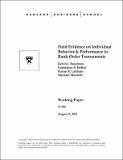| dc.contributor.author | Boudreau, Kevin | |
| dc.contributor.author | Helfat, Constance E. | |
| dc.contributor.author | Lakhani, Karim R | |
| dc.contributor.author | Menietti, Michael E | |
| dc.date.accessioned | 2012-09-04T19:39:05Z | |
| dc.date.issued | 2012-09-04 | |
| dc.identifier.citation | Boudreau, Kevin J., Constance E. Helfat, Karim R. Lakhani, and Michael Menietti. "Field Evidence on Individual Behavior & Performance in Rank-Order Tournaments." Harvard Business School Working Paper, No. 13-016, August 2012. | en_US |
| dc.identifier.uri | http://nrs.harvard.edu/urn-3:HUL.InstRepos:9502862 | |
| dc.description.abstract | Economic analysis of rank-order tournaments has shown that intensified competition leads to declining performance. Empirical research demonstrates that individuals in tournament-type contests perform less well on average in the presence of larger number of competitors in total and superstars. Particularly in field settings, studies often lack direct evidence about the underlying mechanisms, such as the amount of effort, that might account for these results. Here we exploit a novel dataset on algorithmic programming contests that contains data on individual effort, risk taking, and cognitive errors that may underlie tournament performance outcomes. We find that competitors on average react negatively to an increase in the total number of competitors, and react more negatively to an increase in the number of superstars than non-superstars. We also find that the most negative reactions come from a particular subgroup of competitors: those that are highly skilled, but whose abilities put them near to the top of the ability distribution. For these competitors, we find no evidence that the decline in performance outcomes stems from reduced effort or increased risk taking. Instead, errors in logic lead to a decline in performance, which suggests a cognitive explanation for the negative response to increased competition. We also find that a small group of competitors, who are at the very top of the ability distribution (non-superstars), react positively to increased competition from superstars. For them, we find some evidence of increased effort and no increase in errors of logic, consistent with both economic and psychological explanations. | en_US |
| dc.language.iso | en_US | en_US |
| dash.license | OAP | |
| dc.title | Field Evidence on Individual Behavior & Performance in Rank-Order Tournaments | en_US |
| dc.type | Research Paper or Report | en_US |
| dc.description.version | Author's Original | en_US |
| dc.relation.journal | Harvard Business School working paper series # 13-016 | en_US |
| dash.depositing.author | Lakhani, Karim R | |
| dc.date.available | 2012-09-04T19:39:05Z | |
| dash.contributor.affiliated | Menietti, Michael | |
| dash.contributor.affiliated | Boudreau, Kevin | |
| dash.contributor.affiliated | Lakhani, Karim | |
| dc.identifier.orcid | 0000-0003-2787-9599 | |


